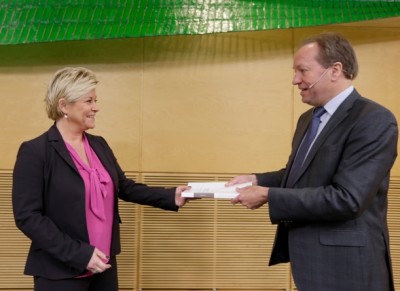An expert panel of economists and statisticians presented Norway’s conservative government on Tuesday with the country’s most comprehensive tax reform proposal in more than 20 years. What started as a request to evaluate how Norway taxes companies left the politicians facing a major overhaul of the entire Norwegian tax system.

Finance Minister Siv Jensen accepted the report from the Scheel Commission led by Hans Henrik Scheel, head of Norway’s state statistics bureau SSB (Statistics Norway). Scheel was joined on the commission by lawyers, professors and economists, and they all agreed that Norway should reduce taxes on company profits and personal income while increasing, for example, taxes on real estate.
Their proposals would radically change how taxes are assessed for ordinary Norwegians, in addition to how companies and capital are taxed. The commission concluded that Norway’s corporate income tax is “relatively high” by international standards, and it should be reduced to 20 percent at the same time measures are put in place to restrict the transfer of corporate profits to other countries. The aim is to stop companies like Google and other corporate giants from transferring profits generated in Norway to other company units abroad, and thereby avoiding taxes in Norway. In Europe, Luxembourg has become the country of choice for companies keen to reduce their tax burden.
State property tax urged
The commission quickly recognized, however, that the loss of state revenues on its proposed reduction in tax on companies must be offset somehow, and that’s why their report dominated headlines and newscasts in Norway on Tuesday. The commission dared to propose a significant reduction in personal income tax as well, in return for new taxes on real estate including Norwegians’ homes, holiday homes and investment property.

Norway, despite its reputation for being a high-tax country, has never imposed a direct property tax beyond that which some municipalities have introduced at a relatively modest rate. Norwegians who rent out apartments within their primary resident have also never had to pay tax on the rental income, and a sizable chunk of any income they generate by renting out vacation property is also tax-free.
Property is taxed as part of individual net worth, through Norway’s controversial formueskatt (fortune tax) that the current conservative government coalition wants to reduce and eventually remove entirely. Property values assessed for tax purposes, however, only amount to around 25 percent of market value, which is another reason why Norwegians traditionally have invested heavily in their homes and other real estate. While a million kroner in the bank would be taxed at its actual cash value, a million kroner worth of real estate is only assigned a value of around NOK 250,000 and taxed accordingly.
Real estate is also popular because mortgage debt can be deducted in full and interest paid on the debt is deductible as well. Capital gains realized on the sale of property are not taxed if invested in another property.
Meanwhile, Norway’s real estate market has been red hot in recent years, with average home prices in the Oslo area quadrupling over the past 20 years. Affordability has become so difficult for first-time home buyers that most have no chance of buying a home without help from parents or grandparents who pass on inheritance proceeds in advance.
Reducing the tax advantages of real estate
The Scheel Commission advises doing away with many of the tax advantages of owning property in Norway, not only to raise new tax revenues but also to cool down the real estate market. It proposes raising tax values on all property, for example, to fully 80 percent of market value and imposing taxes on rental income from units within a homeowner’s primary residence. The former would seemingly boost individual net worth and fortune taxes dramatically, but the commission recommends nearly doubling the standard exemption on net worth, from NOK 1.2 million to NOK 2.1 million per person, while also reducing income taxes from the standard 27 percent now to just 20 percent.
Economists immediately embraced the Scheel Commission’s tax reform proposals, claiming they would shield most Norwegians while boosting taxes on the wealthy with expensive homes and holiday homes. Critics worried the tax reform would do much more than “cool down” the real estate market, though, and could damage it severely.
Norwegian politicians from both ends of the political spectrum have long resisted taxing property in Norway. Home ownership has always been promoted and encouraged in Norway, so there’s widespread opposition to imposing a national property tax, especially on homes. Finance Minister Jensen of the conservative Progress Party quickly stated upon receipt of the commission’s report that “I can say right away: Tax on homes is not on this government’s menu.”
Fortune tax itself at stake
The current government is also likely to object mightily to the commission’s proposal to not only retain Norway’s fortune tax but increase it. The government just spent weeks in state budget negotiations trying to slash the fortune tax, and is not expected to go along with keeping it, much less raising it.
Debate is now likely to take off in Parliament, also over other commission proposals to replace Norway’s so-called toppskatt (highest tax rate) with a progressive income tax tied to salary levels. The commission also proposes raising Norway’s lowest VAT level to 15 percent and eliminating various tax deductions like those for the costs of commuting to work, paying union dues and making charitable donations.
There is widespread agreement in Parliament that corporate income tax should be reduced, to keep tax-paying businesses in Norway. It’s the commission’s other proposals, for offsetting revenue loss, that are difficult to swallow.
“Now the commission’s report will be handled politically,” Jensen announced. “I expect we will have a hefty debate. There can’t be any doubt that the government has quite a different view than those that come through on several issues in this report.” The report will now be put out for hearing, before the government sends it over to parliament.
newsinenglish.no/Nina Berglund

